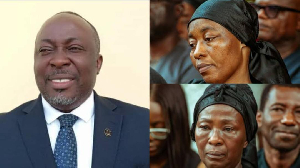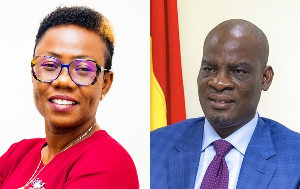GHANA’S ANTI-HIV/AIDS CAMPAIGN: Give The Ghanaian Woman An Option In Protection, The Female Condom
Kwabena Amponsah-Manager, talkafrique.com
An estimated 22.5 million people are living with HIV in the part of African below the Sahara – around two-thirds of the global total. In Ghana, there are approximately 260,000 people living with HIV/AIDS with 140,000 being women and 27000 being children. Ghana can count close to 160,000 orphans as a result of HIV/AIDS.
To some readers, this is just one of those statistics, but it is life and death to hundreds of families and institutions. The social and economic consequences of the AIDS epidemic are far and wide felt: in the Ghanaian health sector, in education, industry, agriculture, human resources and the economy in general.
In terms of preventive or ‘prophylactic’ measures, the anti-HIV/AIDS campaign hitherto has riveted on promoting the use of the male condom.
Regrettably, however, in many communities in Ghana, it is a severely stamina-testing exercise to convince some men embrace the use of the male condom. It is a complex issue that borders on tradition, religion and ignorance. This is compounded by the fact that in almost all cases, it is the man who cleaves to power in sexual relationships. Customarily, in the Ghanaian ‘sexist society’, the man can choose to have multiple wives or one wife with multiple sexual partners. A woman who practices such a modus vivendi is referred to as a prostitute. It is unfair and effluvium for the party who wields the power to manage the means of protection in sexual relationships. I regard it a woman’s right issue to guarantee that women have the wherewithal to protect themselves in sexual relations.
But what is wrong with the male condom?
The campaign to promote the male condom has been going on for decades with some progress. Nevertheless, such progress does not well correlate with the efforts that have been expended. Some of the pretexts some Ghanaian men put forward in opposition to the use of condoms include the following:
• Condoms diminish pleasure or enjoyment of sex
• Condoms ruins the mood
• You cannot feel anything while wearing a condom
• If a women loves a man, then she you should just trust him
• in order for sex to be real, fresh must come into contact with fresh (of course, condoms make this pre-requisite unattainable)
• Some even think it is sin to use the condoms during sex
For these reasons, I advocate that future anti-HIV campaigns adjust the current model and focus more on promoting the use of the female condom. The female condom should be promoted as an alternative to the male condom and should be available to all sexually active women. I believe that there should be a sharpened campaign to give credence to the female condom in Ghanaian communities until it ultimately becomes a mainstream accessory in the woman’s purse.
The Female Condom:
The female condom is a thin, soft loose-fitting polyurethane plastic pouch that is used during intercourse to prevent pregnancy and reduce the risk of sexually transmitted diseases. It has flexible rings at each end. Just before vaginal intercourse, it is inserted deep into the vagina. The ring at the closed end holds the pouch in the vagina. The ring at the open end stays outside the vaginal opening during intercourse. And during anal intercourse, it is inserted into the anus.
The penis is directed into the pouch through the ring at the end, which stays outside the vaginal during the intercourse. By covering the inside of the vagina or anus and keeping semen and pre-cum out, female condoms reduce the risk of sexually transmitted infections.
Why the Female Condom.
• The female condom is more acceptable to most men as it does not constrict the penis as do latex condoms and hence does not result in a significant decrease in sensation.
• It provides an opportunity for women to share the responsibility for protection with their partners
• It gives the woman some amount of power which in most cases is totally vested in the man.
• Research shows that, if women always use the female condom correctly, only 5% of users will report unexpected pregnancy each year. It can even be made more effective if used with a spermicide.
• A woman may be able to use the female condom if her partner refuses to use the male condom
•
• Unlike the male condom which is inserted in the heat of the moment and can therefore ruin the mood, the FC or FC2 female condom can be inserted up to 8 hours before intercourse so as not to interfere with the moment.
While the statistic remain ugly, it is vital that women take charge over their own health and not depend solely on their partners in making decisions relating to sexual matters.
How Do We Get There?
The main disadvantage of the female condom is that it is three times more expensive than the male condom and therefore beyond the means of women in Ghanaian communities where the average income is less than a dollar a day. (The cost of the female condom is between $2.50 -$5.00). This is the gap that the Government, Non-governmental Organizations and Foundations involved in the anti-HIV/AIDS campaign need to fill. By making the female condom easily accessible to all sexually active women in Ghana, including prostitutes, we as a nation will make significant advancement in the fight against HIV/AIDS, other sexually transmitted diseases and unwanted pregnancy.
Again, even as we have done in the past and continue to do with the male condom, we need an aggressive campaign to educate our women that they have an option. Empower the ministry of health to provide free samples to sexually active women whenever the visit any health facility. The media should play their role, community leaders should not be left out, and religious organization should recognize that their support is vital.
The statistics are premonition, but it is not too late to apprehend the trend. The cost will be worth it.
About the Author:
Kwabena is a Ghanaian resident in the USA. He has a Masters degree in Biochemistry from the
University of Ghana, and a PhD in Chemistry from the University of Florida. In his spare time, he writes on diverse issues affecting Africa on the blog www.talkafrique.com
Opinions of Thursday, 13 January 2011
Columnist: Amponsah, Kwabena












